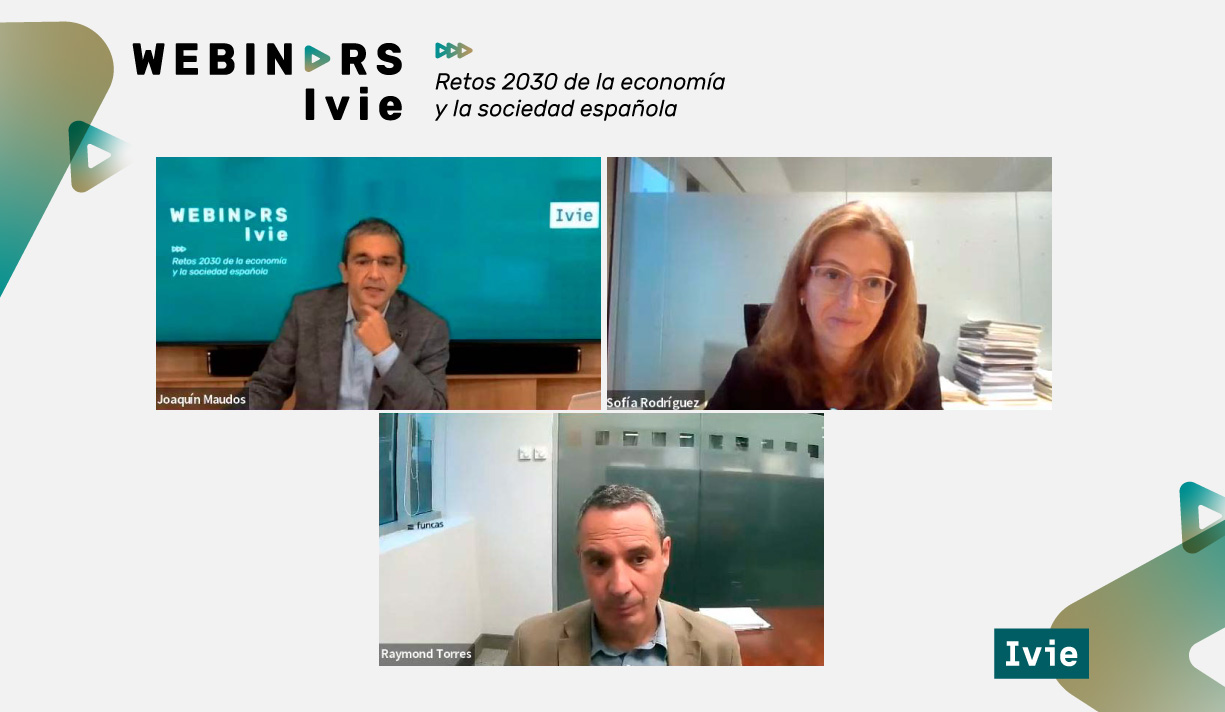Esta web utiliza cookies para que podamos ofrecerte la mejor experiencia de usuario posible. La información de las cookies se almacena en tu navegador y realiza funciones tales como reconocerte cuando vuelves a nuestra web o ayudar a nuestro equipo a comprender qué secciones de la web encuentras más interesantes y útiles.
News

The pandemic is putting less pressure on the economy and a quick, but uneven, recovery is expected
Sofía Rodríguez, economista jefe del Banco Sabadell; y Raymond Torres, director de Coyuntura y Economía Internacional de Funcas; analizan los retos de la recuperación económica en el primer webinar Ivie de 2022
The recovery of the economy from the impact of COVID-19 is expected to be a solid, firm one, while the pandemic loses its central importance as a determinant of the economy and the markets, according to the participants of the Ivie Webinar “National and international macroeconomic challenges: recovery, indebtedness and inflation”, moderated by Ivie Research Deputy Director, Joaquín Maudos. The speakers, Sofía Rodríguez, Chief Economist at Banco Sabadell, and Raymond Torres, Director of Business and International Economics at Funcas, discussed in detail the levers and deterrents to an economic recovery.
In the first 2022 conference of the series of Webinars organized by the Ivie which began last year, 2030 Challenges for the Spanish Economy and Society, Sofía Rodríguez focused her presentation on the international economy with some central aspects, such as, COVID-19, inflation, Russia-Ukraine conflict, reaction of central banks and monetary tightening of credit conditions. She added that “the spike in prices is more extended in time, with higher levels and increasing prevalence, than originally foreseen”. However, she also explained that the transitory causes of inflation as a result of the pandemic, i.e. logistical problems in global production chains or reduced mobility of workers, will soon subside.
The Chief Economist at Banco Sabadell also emphasized that this crisis is different from the international financial crisis experienced at the beginning of the century, thus, a quick recovery is expected, with most economies growing strongly and recovering to pre-pandemic levels of activity and production in 2022.
However, she also highlighted two observations within the recovery context. First, the pandemic has hit sectors and countries at different levels, and, on the other hand, it has sparked a transformation of the economy towards digitalization and sustainability which are highly disruptive, creating winners and losers.
Sofía Rodríguez also referred to the impact of the Russia-Ukraine conflict on the economy, especially because of the pressure it can put on energy prices and inflation. However, if the scenario is not a full invasion and sanctions are reasonable, she did not consider it a concern for economic growth.
Meanwhile, Raymond Torres focused his presentation on the Spanish economy after the pandemic, agreeing with the diagnosis of a solid and firm recovery, although uneven by sectors, with some lagging behind, such as tourism, restaurants and automobiles.
With regard to inflation, he explained that the increase in energy prices goes in hand with a change in relative prices, indicating a more persistent inflation that requires changes in economic policies, beginning with monetary ones.
In this regard, a reactivation of European fiscal rules is emerging from the pandemic parentheses, explained Torres. “After two years of an expansive macroeconomic policy which was needed to avoid a harsher impact of the pandemic, the rules of the game are changing”. The challenge that Spain faces now is to uphold expansion in a less friendly context and with very high debt. “Starting in the second quarter of the year, we will have to get used to a context of higher interest rates and more public debt in the market.”
Raymond Torres commented on some other issues facing the Spanish economy, such as, a low productivity rate, the energy transition to renewables, and a labor market challenged by a demographic shift. These challenges imply that “we have to correct budgetary imbalances without derailing economic recovery, by reforming the pension system, reconsidering tax exonerations or reevaluating public spending.” He also recalled the need to properly manage Next Generation EU funds to reach a real transformation of the economy.
Finally, he referred to two levers the Spanish economy has in order to achieve these advances. First, digitalization, which will allow a change in the organization of work and help companies grow, and, second, energy transformation, which will require more investment in renewable energy and human capital.


